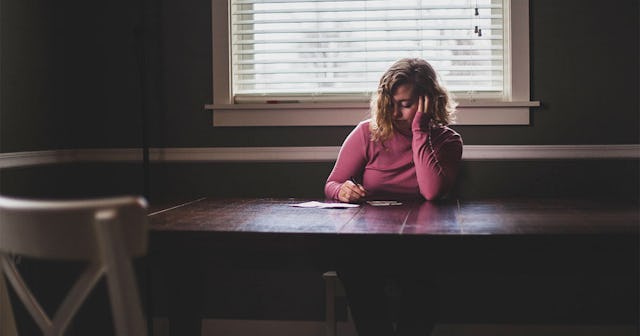Why I Won’t Leave Grief Out Of My Relationship

The hardest thing I’ve ever done is bury my forty-year-old husband. The second hardest thing I’ve ever done is date after burying my forty-year-old husband. (Well, maybe third hardest. Raising two grieving children by myself is as hard as one might imagine.)
But I’m doing it. For a variety of reasons that are the subject of a different essay I haven’t yet found the words for, I’ve decided to jump—jump, wade, stumble, and trip—into the dating scene.
And dating in your (late) thirties is as difficult as the rumors suggest. There are bumps in the road that weren’t there the first time I entered the dating scene as a fresh-faced twenty-something. There are jobs and kids and mortgages. Everyone, including me, is more jaded and set in their ways. There’s baggage that once wasn’t there.
Dating in your late thirties as a widow and solo parent is even more difficult than that. There’s all that comes with simply dating in your thirties, plus more. Guilt commingles with hope. Butterflies of excitement flutter in and through the cracks of a broken heart. New memories are created as old memories play in the back of your mind. There’s never a moment on any date during which I’m not holding two contrasting emotions. (Sometimes I think that ability—to hold two completely opposing feelings at once—is a widow super power, because all super heroes have tragic origin stories, right?) There are logistics that often seem impossible to figure out at best, or completely insurmountable at worst, and conversations that are wildly uncomfortable. And there’s grief.
So much grief at every single step of the way.
The very first date when the man I met looked like a twenty-year-older version of the picture that accompanied his profile: it was dominated by grief because I was supposed to be done with first dates. (To be fair, it would have been dominated by grief even if he’d looked like his picture.)
The first time I went to a restaurant I’d gone to with my husband with a new man: grief layered over grief because the past was playing on loop in my mind, superimposing itself onto the present.
The first time someone broke my heart: the hurt threatened to destroy any bit of forward progress I’d made. Not because the heartbreak was that devastating, but because my heart was supposed to be safe from these kind of trivial dings. And because any heartbreak sends me reeling back to that ultimate heartbreak: the moment I took a breath and he didn’t.
Recently, I was chatting with a friend about a speed bump I’d hit in a new relationship. The bump was minor; the grief was not. The details of the speed bump are largely irrelevant—speed bumps are inevitable when two people with full lives attempt to date. And yet, this speed bump happened to fall around the same time as the anniversary of the day my late husband had asked me to marry him. As a result, the minor speed bump was tearing me up.
A friend advised me to separate the grief. It’s good advice. Sound, logical advice that I should follow. But I told her I couldn’t—and wouldn’t—separate the grief. Not because I was being stubborn, and not because I couldn’t see the benefit of separating the grief from the issue at hand, but because grief is, and always will be, a part of who I am now.
When my husband died, the person I was when he was alive died, too. Everything from the way I smiled to the way I thought and breathed and lived was different. It took what felt like an eternity to learn to be this new person, to think the way she thought and breathe the way she breathed and live the way she lived. It was a hard-won battle, and one that I’m proud to have won (or proud to be learning how to win because it’s an ongoing process). But the only way I could have won that battle was by embracing the grief, by accepting that every moment will have a lining of grief. Which means that this lining of grief isn’t something to hide or be ashamed of, or even something that I want to change. It’s just a part of me, a battle scar of sorts.
As a result, anyone who wants to be with me, as a friend or otherwise, has to appreciate the grief part of me, that invisible battle scar.
Accepting the grief part of me doesn’t mean giving me free rein to be horrible or irrational. If I am, anyone in my life is free to call me out and to expect an apology. Grief doesn’t mean immunity from basic decency or a pass for all mistakes.
But it does mean sometimes I’m more emotional than someone else might be. It means small deals may feel like big deals to me and the date on the calendar is the reason a speed bump suddenly looks like a roadblock. But also I’d like to think it means I’m more compassionate and more able to see the forest for the trees.
The truth is, I can’t separate the grief, because as a young widow, I was forged in grief. That battle scar is too much a part of my foundation. The people meant to be in my life will love me not despite the grief, and not because of it, but because I am me, invisible scars and all.
This article was originally published on